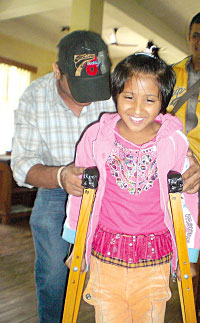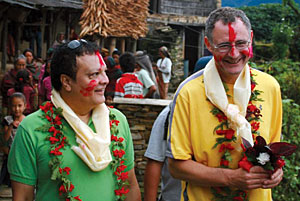 BIKRAM RAI |
Ashok K Banskota is the doctor better known for being the founder of B&B Hospital that specializes in orthopedic care. But there is a philanthropic side to him that few know about. It was for this that he was honoured recently with the World of Children Award for Health which he will receive in November in New York.
Banskota set up the Hospital and Rehabilitation Centre for Disabled Children (HRDC) in Banepa 27 years ago as a world class centre for quality health care. Thanks to HRDC's reconstructive surgery thousands of children with deformities and disabilities live improved lives. The hospital, which doubles as a rehabilitation centre, has treated 43,000 children.
"Thirty years ago when I returned from the US, it was impossible not to be affected by the plight of children suffering from disabilities," Banskota told Nepali Times this week. "Poverty and social ostracism compounded their suffering, and that is how the idea for HRDC came up."
He had left his career option in the US to return to Nepal and do what he always desired: make use of his expertise to serve ordinary Nepalis. "We can either turn our backs to the country or use our skills to enhance the health care system here. The second road was more difficult but it was worth pursuing," he said.
 |
The hospital has found a workable sustainability model and finances its treatment through the sale of artificial limbs. It also plans to set up a trust fund to cover running costs.
The hospital now has eight fully equipped departments, well-trained doctors and a tie-up with Kathmandu University to run a 3-years MS program in Orthopedic surgery.
Says Banskota: "Ultimately the challenge is to continue what you start. We have trained many doctors to take our work forward."
Rubeena Mahato
Long-lost classmates
 BFF: Ashok Rana with Stephen Russel at Thak in Kaski |
They had last met together 39 years ago while in boarding school in Scotland, but when Ashoke Rana, Stephen Russel and Stefan Kosiuszko met again in the village of Thak in Kaski recently it was a moment to cherish.
Rana is now CEO of Himalayan Bank, Russel is a professor of molecular medicine at the world-renowned Mayo Clinic in the United States and Kosciuszko is the Asia-Pacific adviser with the London-based business services company, Praetoria. What brought the three to the tiny town north of Pokhara is Kosciuszko's daughter's fondness the place and the fact that Rana is Nepali.
Russell is involved with cutting edge research into virotherapy treatment of multiple myeloma at Mayo, and used his first visit to Nepal to stop by at the Bhaktapur Cancer Hospital and to drop in to see President Ram Baran Yadav for a doctor-to-doctor chat.
"Coming from a very privileged medical environment, I was amazed with the dedication of doctors in Nepal who have to improvise, work with rudimentary equipment, it ends up being a labour of love," Russell told Nepali Times.
Russell noticed that the radiation therapy equipment at Bhaktapur were not working because of the depletion of radioactive cobalt-60, and he was told there was no money to replace it.
Kaski had just been declared an open-defecation free district when Rana, Kosciuszko and Russell were in Thak, and they noticed that most village homes now had latrines. Russell admits prevention is important in a country where most diseases are infections, but one can't forget treatment. "You get more bang for the buck if you get preventive," he said, "but you still need to treat sick people."
And he did get a chance to treat a patient in Thak who had severe chronic headache and numerous doctors hadn't been able to diagnose it. Russell examined him and suspected that he had temporal arteritis, which inflames the arteries supplying blood from the neck to the head.
While in Thak, the three school mates had a chance to talk about Nepal and catch up with their careers. Russell left his job with the British Medical Research Council in Cambridge to join Mayo. Kosciuszko keeps his ties with Nepal because of his daughter's love for the country, while Rana says the trio's friendship could be used to help Nepal.
Says Russell: "I want to explore the possibility of an interface between the Mayo Clinic and the health system here."
While traveling from Kathmandu to Pokhara, the visitors said they were struck by the highway, and how it is a river of life with everything going on along the road.
They also noticed Kathmandu Valley's malignant growth and how it depends on one crumbling highway for its supplies. Says Russell: "One gets the sense of it all being very precarious, things feel like they are on the brink, that something has to give."


